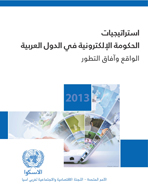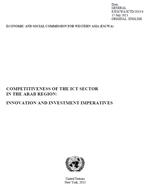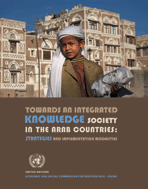Academy of ICT Essentials for Government Leaders in the ESCWA Region (AIGLE)

The “Academy of ICT Essentials for Government Leaders in the ESCWA Region” (AIGLE) project aims at helping policymakers in Arab countries to build capacities, in order to narrow ICT human resources gaps, reduce barriers to ICT adoption and promote the application of ICT in accelerating socioeconomic development. Indirectly, it helps achieving the Millennium Development Goals as well as the Sustainable Development Goals. It builds upon lessons learned and achievements of a similar academy that was launched in 2008 by the Asian and Pacific Training Centre for Information and Communication Technology for Development (APCICT), located in Korea, within the region of the Economic and Social Commission for Asia and the Pacific (ESCAP).
AIGLE strives to enhance the capacity of national partners, mainly public administration teaching institutions, information technology or e-Government authorities and agencies. It will also pave the way for the establishment of ICT for development (ICT4D) training programmes through participation of concerned and interested national institutions and individuals and ownership of the process, thus maximizing the impact and ensuring the sustainability of the Academy.
Activities
Following an analysis of APCICT curriculum and based on a regional survey and needs assessment in the area of ICT for Development (ICT4D) four training modules were developed in Arabic for the benefit of all government leaders in Arab countries, through updating, localizing and adapting selected APCICT modules to the specificities of the region.
A Web site for the AIGLE project, including an online training platform, is developed and two regional/sub-regional workshops are also organised by ESCWA and its national partners for training future trainers on these modules. Selected national training sessions are also organised to train top and middle management on ICT4D. These activities allow for the dissemination of the training modules and the establishment of the Academy in the Arab region.
Training modules
The four selected modules, which received the highest scores in the survey regarding the need to train civil servants at the top and middle management levels, are:
- Linkage between ICT applications and development;
- ICT for development policies: main elements and tools for management;
- e-Government: policies, strategies and applications;
- Internet governance.
These four modules, written in Arabic, were prepared by experts in the fields based on similar APCICT modules and constitute the core of current training supported by the Academy. Peer reviews were carried out for each of these modules, followed by dry runs in which authors and reviewers discussed various facets and enhancements related to the content, style and form of modules. An appropriate and attractive design was later carried out before printing and posting on the Web site for free download and use in online training.
Partnership
- During the course of the project, collaborative partnerships are established with other United Nations Regional Commissions, mainly ESCAP (through APCICT) and ECA , in addition to governmental and academic institutions in the Arab region related to capacity-building in public administration. Four partnership phases can be distinguished:
- Phase 1: Collaborate with ESCWA on the development and deployment of the survey for needs assessment, providing feedback on the draft questionnaire, supplying a list of national institutions and individuals to be surveyed and following up on responses from these institutions and individuals;
- Phase 2: Collaborate with ESCWA on developing training material in the form of modules/courses, by suggesting topics under each module, providing case studies for selected modules and/or reviewing the drafted material for these modules;
- Phase 3: Participate in training-the-trainers activities, by providing potential trainers to be trained on delivering the various modules and carrying out training at the national level;
- Phase 4: Carry on the national rollout of the Academy, by promoting it at the national level and helping other institutions introduce ICT4D in their training programmes, adopt available modules and carry out actual training of civil servants and evaluating its results.
Future prospects
Through building AIGLE and developing training modules, ESCWA hopes to contribute positively to the creation of a regional institution that works towards building the capacities of government leaders in the Arab region in ICT4D. In order to develop and expand, the Academy should gain the trust of national training institutions for public administration in Arab countries. This can be achieved through building an effective partnership with organisations that care about capacity building of government leaders through transfer of knowledge and experience, in order to develop the digital economy and accelerate socioeconomic development in the region.








